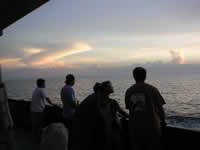


|
The Project Part 1: Part 2: Part 3:
|
13 August, 2005
|
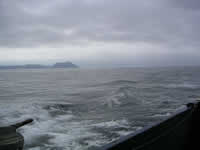 Cedros Island, North Baja Note the change in sea color on the Pacific side of Baja. 8/10/05 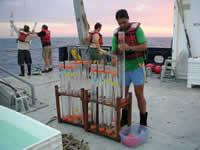 Sediment traps 8/2/05 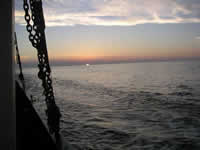 Another great sunset in the Gulf 8/4/05 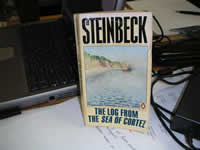 Inspiration 8/12/05 |
This trip to the Gulf of California is a bit unusual because of the long transit time to and from San Diego- four and a half days each way. Combating boredom and being away from family and friends are issues with which everyone onboard must contend. The Sea of Cortez and the abundance and exuberance of the sea life that abounds there went a long way in alleviating tedium. When you see a marlin shoot into the air, and dolphins, whales and tuna cooperatively hunting their meals, you know it was worth every second you had to travel and wait to see them.
Oceanography is a multidisciplinary field; we have chemists, geologists and biologists working this cruise. The res tech (resident technician) is the person responsible for making sure all the technology is up and running; his knowledge of electronics and computers is considerable. Oceanographers also depend on the crews that operate the ships. It doesn’t matter how many authorities with doctorates are on board; the captain of the ship is the person ultimately in charge. Safety is the overriding consideration.
So why do people engage in this sort of work? Some truly enjoy life at sea: the beauty and vastness of the ocean appeal to our sense of adventure and challenge us in ways the land cannot do. The world on a ship shuts out the larger world from which it left. Our duties seem unambiguous because our actions are limited by the finite dimensions and requirements of the ship. Can this be said of our lives on the land, where our choices, multiple and complex, demand that we function in some sort of perpetual uncertainty? Perhaps people are drawn to the seas because it’s just more straightforward than life on land.
Why should we study the ocean? It is an expensive and difficult undertaking that has few commercial applications. I guess the basic question that justifies this research is to ask how important is the ocean to the health of our planet, and therefore to us? The world ocean covers 70% of the planet. 97% of all water on earth is in the ocean. Most scientists believe life began in the ocean. The ocean lives inside us. The body of an adult male contains about 19 quarts of salt water. The chemical and mineral composition of this fluid is similar to seawater. The ocean is the source of most of the precipitation that falls to the earth. The ocean serves as a source of food, energy, minerals, and medicines. It is vital for transportation and trade. It provides recreation in the form of boating, fishing, and swimming.
Without the seas and the microscopic plants within them that oxygenated our atmosphere, the planet would not be inhabitable by the life forms we know today. How much carbon dioxide do phytoplankton convert to oxygen today? I don’t know, but I sure like inhaling oxygen. If the ocean is the primary component in determining what our weather and climate is, and if 60% of the world’s protein supply comes from the seas, don’t you think we’d better find out what makes it tick and keeps it healthy?
Space exploration and the men and women that travel there capture the public’s attention. I bet you can rustle up several names of astronauts and the expeditions they’ve undertaken in the last 45 years. But how many oceanographers can you name? What was the first oceanographic research expedition ever organized and what country made it possible (that would be the British Challenger expedition in 1873 and 1876). My point is that the ocean has a greater impact on the continued health of all life on our planet than the black depths of outer space. And the work oceanographers do is as much cutting edge science as the teams of people who shoot rockets and men into the sky. Oceanographers also forge the experiments they perform in and on the ocean. Then they create the technology to carry them out.
The ocean is just as mysterious and dangerous as space, but it’s a lot closer and more accessible. I don’t find much comfort gazing into the icy infinity of the universe; in fact, it just magnifies how insignificant you and I really are. But, for some reason, when I look at the sea, I feel calmer and less harried. Oceanographic research deserves your attention, tax dollars and support, especially in an age where “we wonder whether in the present pattern the pieces are not straining to fall out of line; whether the paradoxes of our times are not finally mounting to a conclusion of ridiculousness that will make the whole structure collapse. For the paradoxes are becoming so great that (the) leaders of people must be less and less intelligent to stand their own leadership.” Steinbeck wrote this over 60 years ago in The Log from the Sea of Cortez. Our leaders today either deny the human impact on climate change or pass off platitudes about “adapting to it.”
As Fred so aptly said, “it’s a long way to the next oasis so we better take care of the one we’ve got.
![]()

